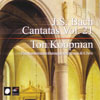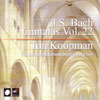Bach Cantatas, Vol 21
A variable end to a variable series
View record and artist detailsRecord and Artist Details
Composer or Director: Johann Sebastian Bach
Genre:
Vocal
Label: Challenge Classics
Magazine Review Date: 11/2006
Media Format: CD or Download
Media Runtime: 0
Mastering:
Stereo
DDD
Catalogue Number: CC72221

Tracks:
| Composition | Artist Credit |
|---|---|
| Cantata No. 100, 'Was Gott tut, das ist wohlgetan' |
Johann Sebastian Bach, Composer
Amsterdam Baroque Choir Amsterdam Baroque Orchestra James Gilchrist, Tenor Johann Sebastian Bach, Composer Klaus Mertens, Bass Ton Koopman, Conductor |
| Cantata No. 200, 'Bekennen will ich seinen Namen' |
Johann Sebastian Bach, Composer
Amsterdam Baroque Choir Amsterdam Baroque Orchestra Johann Sebastian Bach, Composer Klaus Mertens, Bass Ton Koopman, Conductor |
| Cantata No. 177, 'Ich ruf zu dir, Herr Jesu Christ |
Johann Sebastian Bach, Composer
Amsterdam Baroque Choir Amsterdam Baroque Orchestra Christoph Prégardien, Tenor Johann Sebastian Bach, Composer Klaus Mertens, Bass Ton Koopman, Conductor |
| Cantata No. 140, 'Wachet auf, ruft uns die Stimme' |
Johann Sebastian Bach, Composer
Amsterdam Baroque Choir Amsterdam Baroque Orchestra James Gilchrist, Tenor Johann Sebastian Bach, Composer Klaus Mertens, Bass Ton Koopman, Conductor |
| Cantata No. 34, 'O ewiges Feuer, O Ursprung der Li |
Johann Sebastian Bach, Composer
Amsterdam Baroque Choir Amsterdam Baroque Orchestra Johann Sebastian Bach, Composer Klaus Mertens, Bass Paul Agnew, Tenor Ton Koopman, Conductor |
| Cantata No. 143, 'Lobe den Herr, meine Seele' |
Johann Sebastian Bach, Composer
Amsterdam Baroque Choir Amsterdam Baroque Orchestra Johann Sebastian Bach, Composer Jürg Dürmüller, Tenor Klaus Mertens, Bass Ton Koopman, Conductor |
| Cantata No. 158, '(Der) Friede sei mit dir' |
Johann Sebastian Bach, Composer
Amsterdam Baroque Choir Amsterdam Baroque Orchestra Johann Sebastian Bach, Composer Klaus Mertens, Bass Ton Koopman, Conductor |
| Cantata No. 197, 'Gott ist unsre Zuversicht' |
Johann Sebastian Bach, Composer
Amsterdam Baroque Choir Amsterdam Baroque Orchestra Johann Sebastian Bach, Composer Klaus Mertens, Bass Ton Koopman, Conductor |
| Cantata No. 97, 'In allen meinen Taten' |
Johann Sebastian Bach, Composer
Amsterdam Baroque Choir Amsterdam Baroque Orchestra James Gilchrist, Tenor Johann Sebastian Bach, Composer Klaus Mertens, Bass Ton Koopman, Conductor |
| Cantata No. 118, 'O Jesu Christ, mein's Leben Lich |
Johann Sebastian Bach, Composer
Amsterdam Baroque Choir Amsterdam Baroque Orchestra Johann Sebastian Bach, Composer Klaus Mertens, Bass Ton Koopman, Conductor |
| Cantata No. 191, 'Gloria in excelsis Deo' |
Johann Sebastian Bach, Composer
Amsterdam Baroque Choir Amsterdam Baroque Orchestra Caroline Stam, Soprano Johann Sebastian Bach, Composer Klaus Mertens, Bass Paul Agnew, Tenor Ton Koopman, Conductor |
| Cantata No. 195, 'Dem Gerechten muss das Licht' |
Johann Sebastian Bach, Composer
Amsterdam Baroque Choir Amsterdam Baroque Orchestra Annette Markert, Contralto (Female alto) Bogna Bartosz, Mezzo soprano James Gilchrist, Tenor Johann Sebastian Bach, Composer Johannette Zomer, Soprano Klaus Mertens, Bass Sandrine Piau, Soprano Ton Koopman, Conductor |
Composer or Director: Johann Sebastian Bach
Genre:
Vocal
Label: Challenge Classics
Magazine Review Date: 11/2006
Media Format: CD or Download
Media Runtime: 0
Mastering:
Stereo
DDD
Catalogue Number: CC72222

Tracks:
| Composition | Artist Credit |
|---|---|
| Cantata No. 80, 'Ein feste Burg ist unser Gott' |
Johann Sebastian Bach, Composer
Amsterdam Baroque Choir Amsterdam Baroque Orchestra Bogna Bartosz, Mezzo soprano James Gilchrist, Tenor Johann Sebastian Bach, Composer Klaus Mertens, Bass Nathalie Stutzmann, Contralto (Female alto) Ton Koopman, Conductor |
| Mass |
Johann Sebastian Bach, Composer
Amsterdam Baroque Choir Amsterdam Baroque Orchestra Johann Sebastian Bach, Composer Johannette Zomer, Soprano Jürg Dürmüller, Tenor Klaus Mertens, Bass Ton Koopman, Conductor |
| Cantata No. 30, 'Freue dich, erlöste Schar' |
Johann Sebastian Bach, Composer
Amsterdam Baroque Choir Amsterdam Baroque Orchestra James Gilchrist, Tenor Johann Sebastian Bach, Composer Klaus Mertens, Bass Sandrine Piau, Soprano Ton Koopman, Conductor |
| Cantata No. 80, 'Ein feste Burg ist unser Gott', Movement: Chorus: Ein' feste Burg ist unser Gott |
Johann Sebastian Bach, Composer
Amsterdam Baroque Choir Amsterdam Baroque Orchestra Johann Sebastian Bach, Composer Klaus Mertens, Bass Sandrine Piau, Soprano Ton Koopman, Conductor |
| Cantata No. 80, 'Ein feste Burg ist unser Gott', Movement: Choral: Und wenn die Welt voll Teufel war' (chor) |
Johann Sebastian Bach, Composer
Amsterdam Baroque Choir Amsterdam Baroque Orchestra Johann Sebastian Bach, Composer Klaus Mertens, Bass Sandrine Piau, Soprano Ton Koopman, Conductor |
| Cantata No. 30a 'Angenehmes Wiederau' |
Johann Sebastian Bach, Composer
Amsterdam Baroque Choir Amsterdam Baroque Orchestra Christoph Prégardien, Tenor Johann Sebastian Bach, Composer Klaus Mertens, Bass Sandrine Piau, Soprano Ton Koopman, Conductor |
Author: Jonathan Freeman-Attwood
True to the disparate scheduling of sessions, these performances were taped between 1999 and 2005. If a consequent sense of a voyage of discovery and incremental achievement is missing, as it has been throughout, there is still plenty to admire. The instrumental playing is often a class apart from rival sets, certainly when one feels that enough time was available and care taken. When it was, textural vibrancy in the strings, the winsome and delicious strains of flautist Wilbert Hazelzet (the flute figures significantly in “galant” conceit from the cantatas of the mid-1720s onwards), Katharina Spreckelsen’s beautifully judged and blended oboe sound and many other fine players contribute to movements of exceptional colour and purpose. One thinks immediately, in Vol 21, of the delicate filigree of the opening chorus and arias in No 177, a chorale cantata of radiant efficacy where Sandrine Piau and Christophe Prégardien buck the trend of pot-luck solo singing with exquisitely delivered joie de vivre – confirmed in the latter’s aria by the cheerful clucking of an obbligato bassoon.
The distinction between sacred and secular cantatas is significantly blurred in Bach’s later years especially, and secular material is revisited for sacred purpose (and vice versa), as in the two performances of BWV30: the church cantata unabashedly recycling the “welcome” for a new heir to Schloss Wiederau to the prophetic arrival of John the Baptist. The free interchange is also evident in the four so-called Lutheran Masses (Kyrie and Gloria only), where Bach reworked old cantata movements with customary brilliance. Koopman’s readings appear considerably less inhabited or refined (the choral singing is not as good as usual) than Philippe Herreweghe’s Collegium Vocale who produce the most fragrant “period” readings to date.
Indeed, it is the corporate ensemble of the Amsterdammers, conveyed in the contrapuntal gymnastics of Ein feste Burg, the wedding cantatas (Nos 97 and 195, both given dazzling performances) and No 30, which allows the best performances to emerge. When the Amsterdam Baroque Choir lead the line at their glowing best, the results suggest that over-directed Koopman-Bach is often rather less successful than when the music is left to play itself. The ubiquitous Wachet auf is too manipulated (Werner and Ristenpart – Nonesuch, nla – are the answer here) and O ewiges Feuer (No 34) is mundane compared with Richter’s and Gardiner’s triumphal readings.
Again, certain singers carry the day – especially Sandrine Piau and James Gilchrist, the latter profoundly telling in “Ich traue seiner Gnaden” from No 97. One should give special credit to the stalwart of the series, the bass Klaus Mertens, capable of both understanding and beauty, if not immune from the ethos of pragmatism over enlightenment which has prevented this intermittently outstanding series from realising the promising portents of 1995.
Discover the world's largest classical music catalogue with Presto Music.

Gramophone Digital Club
- Digital Edition
- Digital Archive
- Reviews Database
- Full website access
From £8.75 / month
Subscribe
Gramophone Full Club
- Print Edition
- Digital Edition
- Digital Archive
- Reviews Database
- Full website access
From £11.00 / month
Subscribe
If you are a library, university or other organisation that would be interested in an institutional subscription to Gramophone please click here for further information.




